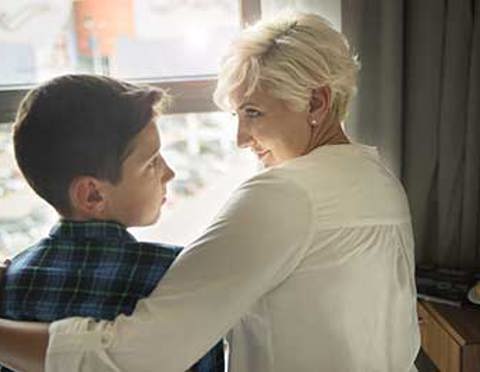Separation and divorce
Information and advice on the impact of divorce on children
Separation and divorce can be one of the most stressful times in an adult’s life.
The journey through feelings of loss, confusion, blame, guilt and anger is hard, as is finding a new way to start over.
So if adults really struggle to accept and adapt to these changes, what impact might separation and divorce have on children?
The impact of separation on children
Some children are able to adjust and cope well. Most will find separation and divorce difficult, and for many it can be painful and traumatic.
During a separation, children experience a huge sense of loss as the world they know changes. Often they don’t understand why it’s happened or what will happen next. The anxiety they feel can be really overwhelming, no matter how old they are.
It can be really confusing for children to see the two people they love the most fight and argue. They may blame themselves or wonder how they can make their parents happy again. They will also be trying to make sense of their own feelings of loss and grief.
Helping children make sense of separation and divorce
When people contact Children 1st Parentline about separation and divorce, we will always try to help them to focus on the impact of what’s happening on their children. Unfortunately, the stress of separation and conflict with an ex-partner can often mean children’s needs and feelings can get a bit lost along the way.
Sometimes, with best intentions, parents try to shield children from what’s happening, and not tell them what is really going on. Without enough information, children will make up their own version of events, often blaming themselves or coming to the wrong conclusions about what will happen.
We always recommend that you talk honestly with your child about what’s happening, giving them the space they need and explaining things in a way that’s appropriate for their age and which they can understand. This can help them make sense of what is going on and shows that you trust and respect them.
If it’s at all possible to keep communication between parents civil and make arrangements in the best interests of their children, it can make an unhappy situation a little easier for the children to cope with.

Tips for explaining separation to children
No age is a good age to have to explain to children why their parents feel they can no longer live together.
You know your own child best and can judge when it looks like they need to talk things through, of if some conversations should be left until later.
The following tips may help:
Make sure they know you both still love them and that things are difficult now but they will get better.
Tell them as much as is appropriate for their age but never lie or sugar coat what’s happening, regardless of how hard this might be.
Some children might not be able to express what they’re feeling, but you can still acknowledge and explore what they are going through. You could let them know that you understand how hard it is and that it’s hard for you too.
Children express their emotions through their behaviour so be prepared for their behaviour and moods changing. They might get angry, withdrawn or upset.
Parents understandably want to fix their child’s big feelings, but they have to come to terms with things themselves. What you can do is listen, acknowledge their feelings and give them space. Treat them with empathy and respect. You will help just by providing the comfort they need and showing you’re interested and you care.
Try, as much as possible, to keep things safe and ‘normal’ for you child. Familiar routines and activities can really help children adjust to changes.
Making their school or club aware means that they’ll be better able to support your child if they need it.
You may want to include your child in decisions that affect them, such as how often they want to see the other parent, changes to after school pick ups, whether they want overnight visits and so on.
Where possible keep contact arrangements consistent and regular. If there are changes to the plan, tell your child in advance, if you can. Read more about contact arrangements and how to make this easier for children.
Even when things get difficult, try not to argue with your ex or criticise them in front of your child. It can make your child feel they need to pick sides at a time when they need the love and support of both their parents.
Teenagers
Divorce can hit teenagers particularly hard, as they are already dealing with a lot of change and worries about identity, peer pressure and becoming a young adult. Read more about ways to respond to teenagers’ behaviour.
Counselling and Relationship Support
Sometimes we all need some professional support to work through our relationship difficulties.

